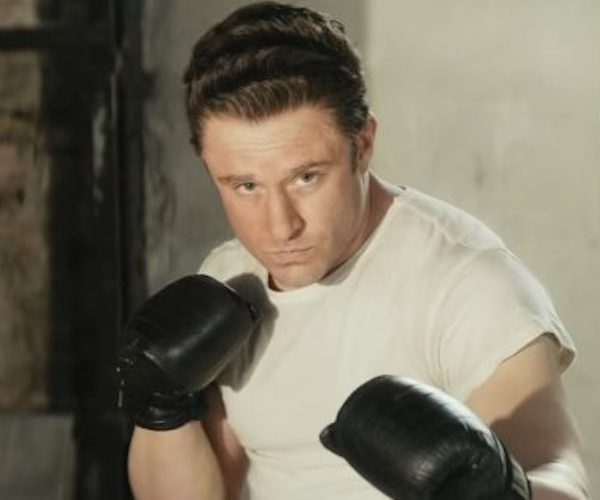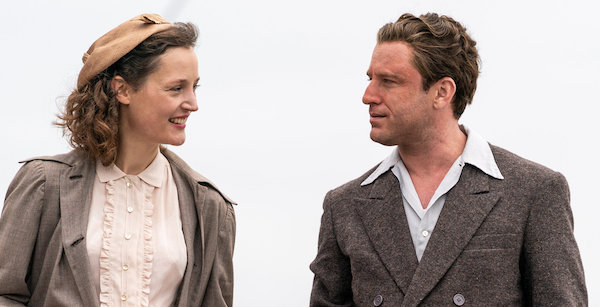Film Review: “The Survivor” – (Living in the Past, Looking to the Future)
By Ed Symkus
Ben Foster shines in Barry Levinson’s grim tale of love, loss, and hope.
The Survivor, directed by Barry Levinson. On HBO/HBO Max

Ben Foster in a scene from The Survivor. Photo: Jessica Kourkounis/HBO/HBO Max
Even boxing aficionados might not know much about the brief career of heavyweight fighter Harry Haft. He only worked as a pro between 1948 and 1949, with a record of 13 wins and eight losses. It’s the story of his life before and after his time in the ring that’s of much more interest.
As a Jewish teenager in Poland in the early-’40s, he was sent to a series of concentration camps, ending up at the dreaded Auschwitz death camp. But, as told in director Barry Levinson’s and screenwriter Justine Juel Gillmer’s The Survivor, it was there that he caught what some people would call a “lucky break.”
A lengthy prelude about that before (Harry and his fiancée Leah are separated by German soldiers) and after (Harry has settled in America and is trying to make it as a boxer), leads to the film developing a pattern of jumping around in place and time, slowly digging into what makes the protagonist tick.
It’s after a bad loss in 1949 that (fictional) journalist Emory Anderson (Peter Sarsgaard) approaches Haft (Ben Foster) and asks if he’ll tell him his story. “I was a survivor of Auschwitz,” says Haft. “Yes, but nobody knows how you survived,” counters Anderson.
It doesn’t take much for the ambitious reporter to realize that though Haft has no interest in sharing that information, he could be persuaded to do so on the long shot chance that when it gets in print, and if Leah is still alive, she might see it and – an even longer shot – they could be reunited. Hell, a newspaper story could even result in enough publicity that Haft could also achieve his dream of landing a boxing match with Rocky Marciano.
How much of the ensuing tale played out here is the whole truth compared to what portions of it are invented is up for grabs, but the resulting film makes for a compelling account of utter hopelessness and possible hopefulness.
Black & white flashbacks to Auschwitz spell out how the feisty Haft was taken under the wing of heinous Obersturmfurer Dietrich Schneider (Billy Magnussen) and transformed into a bare-fisted brawler who, as entertainment for the guards, would participate in weekly matches against other prisoners. The loser would be shot, the winner would receive special treatment. Haft won all of his fights, but an overwhelming feeling of guilt consumed him. And years later, in America, that remorse still hadn’t subsided.

Ben Foster and Vicky Krieps in The Survivor. Photo: Jessica Kourkounis/HBO/HBO Max
There’s some really tough emotional stuff here, most of it occurring in the mind of and on the face of Haft, with Foster, aided by some terrific makeup work, masterfully handling the younger and older roles. Sarsgaard’s underwritten performance feels a bit forced, but those of John Leguizamo, as Haft’s trainer, and Danny DeVito, as Marciano’s trainer, are spot-on and they manage to lighten up the film’s inherent darkness.
Other characters brought in to round out the film’s dramatic edge include Haft’s brother Peretz (Saro Emirze) and Haft’s New York love interest Miriam (Vicky Krieps). Supported by their presence, events continue to unfold: the timeline runs up to 1963, when Haft, long retired from the ring, has settled into running a grocery store and raising a family. But he is still dealing with his haunted past. One more piece of drama involves a return visit by journalist Emory Anderson.
It’s a totally engrossing film strengthened by its constantly changing moods. There are somber moments in the ’60s scenes, horror in the ’40s flashbacks, and bits of humor popping up in unexpected places. The kaleidoscopic heft is ably carried by Foster’s Haft.
Ed Symkus is a Boston native and Emerson College graduate. He went to Woodstock, is a fan of Harry Crews, Sax Rohmer, and John Wyndham, and has visited the Outer Hebrides, the Lofoten Islands, Anglesey, Mykonos, the Azores, Catalina, Kangaroo Island, and the Isle of Capri with his wife Lisa.
